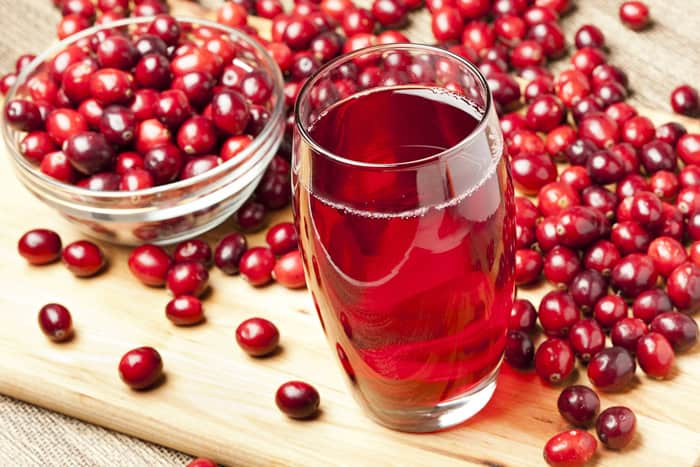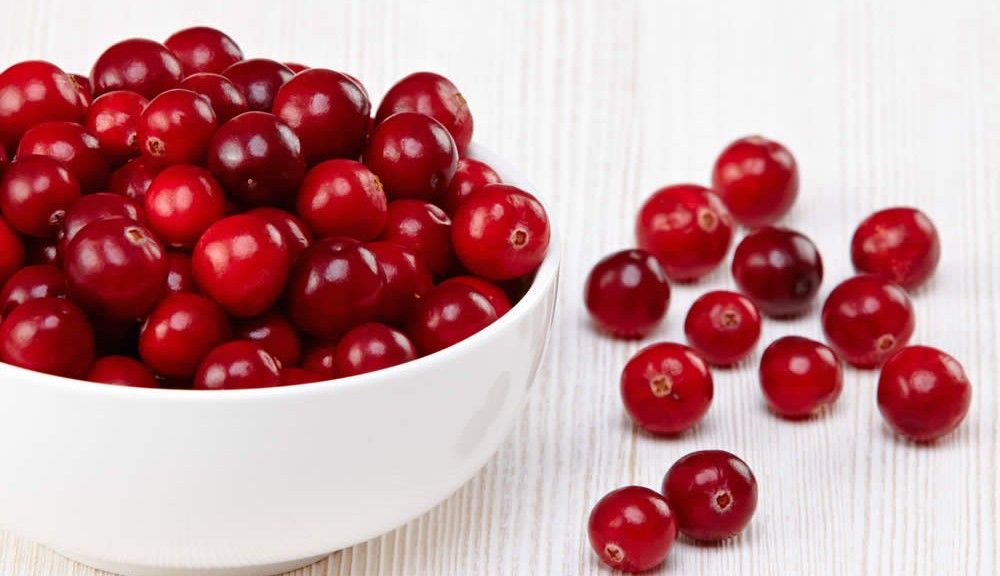
Previous
Signs Your Liver Detox Is Working

Next
Denifanstat May Expand Treatment Options for People with Fatty Liver Disease
Is Cranberry a Good Choice for Liver Health?
Going far beyond their bright addition to a traditional Thanksgiving meal, the cranberry provides some surprising liver health benefits.
Whether being served alongside turkey or mixed with seltzer and a wedge of lime, cranberries are an autumn favorite. Most people think of drinking cranberry juice – unsweetened of course – as a natural remedy for urinary tract problems. However, few realize the benefits cranberry can exert on keeping the liver healthy.
About the Cranberry
The slightly sweet, notably tart cranberry is often referred to as one of nature’s super foods. This title is due to cranberry’s high concentration of antioxidants and various other health-affirming characteristics. More specifically, cranberries contain a unique and potent subclass of antioxidants called proanthocyanidins, which are coveted for their ability to reduce free radical damage and amplify other antioxidants. (1)
Native to the United States and Canada, cranberries are typically harvested between September and October via wet or dry methods. The more common wet harvest is done by flooding cranberry beds, beating the fruit off their vines and then collecting the floating fruit. Dry harvested fruit is obtained by combing the vines with a picking machine.
Cranberry and Liver Health
Drinking cranberry juice and eating cranberries are both liver-friendly practices. There are four reasons that cranberries support liver health:
- Vitamin C – Cranberry juice is very high in vitamin C (ascorbic acid). Vitamin C thins and decongests bile, (2) allowing the liver to metabolize fats more efficiently. This function is especially valuable for those who have excessive fat in their liver.
- Glutathione – Vitamin C boosts the production of glutathione, (3) the body’s universal antioxidant. The liver needs glutathione during the detoxification process.
- Chelation – Proanthocyanidins have a strong iron-chelating capability, (4) meaning that cranberry’s antioxidants bind to toxic drugs and metals, making these substances easier for the liver to remove.
- Free Radical Protection – Full of potent antioxidants, cranberry juice helps protect the liver from free radicals by neutralizing these compounds that are damaging to liver cells. (5)
Three Cranberry Studies About Liver Health
Here are just a few of the studies that demonstrate the benefits of this fruit for liver health:
- A 2020 study published in the International Journal of Food Sciences and Nutrition involved 41 patients with non-alcoholic fatty liver disease—which has since been renamed to metabolic dysfunction-associated steatotic liver disease—who followed a weight loss diet. Those who also took a cranberry supplement (227 mg of cranberry extract or roughly 26 g of dried cranberries) had a greater reduction of their alanine aminotransferase levels, an indicator of liver damage when levels are high. (6)
- A 2023 study in the journal Heliyon connects cranberry polyphenols with suppressed liver damage, meaning that these fruit compounds appear to help protect this vital organ. They work by reducing the levels of certain inflammatory markers (IL-6, TNF-α, and IFN-γ), which helps to prevent and reduce liver damage. (7)
- Another study, this one published in Food Bioscience in 2021, noted that the phytochemicals in cranberries reduce chronic liver injury and inhibit the activation of liver cells that contribute to fibrosis. As suggested in the 2023 study, the phytochemicals in these berries seem to reduce inflammation. (8)
Cranberry Cautions

Cranberry juices or foods are generally safe for consumption, but there are several potential issues that could get in the way of their healthfulness.
- Sugar – Because cranberries are naturally very tart, many recipes add sugar to increase their palatability. Too high of sugar content can interfere with cranberry’s health benefits and may be hazardous to those with obesity or high blood sugar issues.
- Oxalates – Besides containing proanthocyanidins, cranberry is also high in oxalates. For those at high risk for kidney stones, high oxalate levels should be avoided.
- Warfarin – Some sources suggest refraining from eating or drinking cranberry if also taking warfarin or other blood-thinning medication. (9) However, other researchers have found no negative of effect of cranberry on this type of drug. (10)
Cranberry Quantity and Quality
Upon discovering a food with health benefits, many people want to know how much of it they should consume. Alas, eating certain foods for health is not an exact science, but rather a suggestion for how to make the smartest choices.
Adding cranberries to different foods, preparing a cranberry-based dish or drinking pure cranberry juice are all healthful ventures. However, there is no measurement dictating how many cranberries or how many ounces of juice are needed to benefit the liver.
It should be noted that, when selecting cranberries or cranberry products, organic options are best. This keeps you from ingesting harmful substances (pesticides, chemicals, etc.).
The Bottom Line in Cranberries for Liver Health
The beautiful, little reddish-purple fruits harvested in the fall offer those with liver concerns a compelling case. Between helping the liver metabolize fat, detoxifying harmful substances and protecting liver cells from damage, cranberries appear to support the liver’s health in a myriad of ways.
While it is important to beware of sugar and oxalate content and consult with a physician if taking a blood-thinning medication first, increasing cranberry consumption appears to be a wise, liver-friendly dietary decision.
(1) Yang, L., et al. (2018, March 12). Proanthocyanidins Against Oxidative Stress: From Molecular Mechanisms to Clinical Applications. BioMed Research International. doi:10.1155/2018/8584136
(2) Wilson, R.B., et al. (2024, July 09). Molecular Pharmacology of Vitamin C and Relevance to Health and Obesity—A Narrative Review. International Journal of Molecular Science. doi:10.3390/ijms25147523
(3) Kaźmierczak-Barańska, J., et al. (2020, May 21). Two Faces of Vitamin C—Antioxidative and Pro-Oxidative Agent. Nutrients. doi:10.3390/nu12051501
(4) Elessawy, F.M., et al. (2021, June 23). An Untargeted Metabolomics Approach for Correlating Pulse Crop Seed Coat Polyphenol Profiles with Antioxidant Capacity and Iron Chelation Ability. Molecules. doi:10.3390/molecules26133833
(5) Ma, H., et al. (2018, February 03). Evaluation of Polyphenol Anthocyanin-Enriched Extracts of Blackberry, Black Raspberry, Blueberry, Cranberry, Red Raspberry, and Strawberry for Free Radical Scavenging, Reactive Carbonyl Species Trapping, Anti-Glycation, Anti-β-Amyloid Aggregation, and Microglial Neuroprotective Effects. International Journal of Molecular Science. doi:10.3390/ijms19020461
(6) Hormoznejad, R., et al. (2020, April 01). Combined Cranberry Supplementation and Weight Loss Diet in Non-Alcoholic Fatty Liver Disease: A Double-Blind Placebo-Controlled Randomized Clinical Trial. International Journal of Food Sciences and Nutrition. doi:10.1080/09637486.2020.1746957
(7) Sergazy, S., et al. (2023, April). Blueberry and Cranberry Extracts Mitigate CCL4-Induced Liver Damage, Suppressing Liver Fibrosis, Inflammation and Oxidative Stress. Heliyon. doi:10.1016/j.heliyon.2023.e15370
(8) Shi, L., et al. (2021, August). Cranberry (Vacinium macrocarpon) phytochemicals inhibit stellate cell activation and liver fibrosis. Food Bioscience. doi:10.1016/j.fbio.2021.101176
(9) San San Tan, C., Wen Huey Lee, S. (2020, June 01). Warfarin and Food, Herbal or Dietary Supplement Interactions: A Systematic Review. British Journal of Clinical Pharmacology. doi:10.1111/bcp.14404
(10) Attri, N., Farnam-Fard, L. (2020, September 01). Warfarin: Looking Beyond Vitamin K in Diet. Journal of Pharmacology and Pharmacotherapeutics. doi:10.4103/jpp.JPP_101_20







The article on “cranberries for liver health” failed to mention the choice of organic vs. conventional options. If the cranberries are not organically grown, what are the risks of pesticide or chemical fertilizer residue in the cranberries? These chemicals could render the berries harmful to someone with a compromised liver, such as those with Hepatitis C.
There are companies which provide pesticide free products of cranberries.
yes helpful info4-10-13